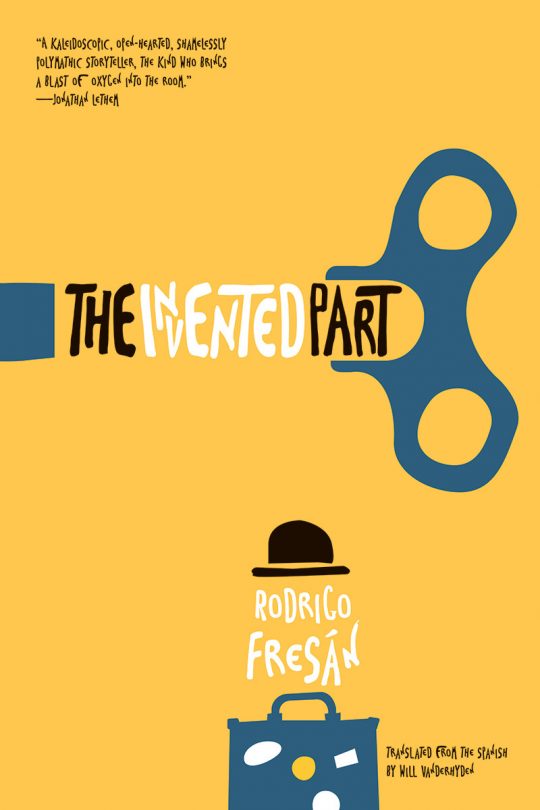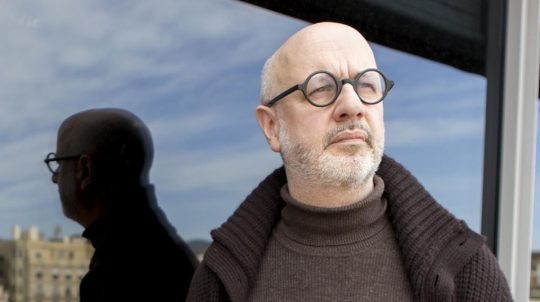Photo by César Cid
Rodrigo Fresán’s The Invented Part is a wild ride of a novel that takes on many different forms. The following excerpt comes from early in the book, and concerns two young documentary filmmakers who are working to put together a project on the novel’s nameless protagonist, a writer who recently threw himself into the Hadron Collider and merged with the God Particle.
As they piece together footage at the writer’s home, they also gather quotes and passages said by the writer in various interviews throughout his career. These are frequently hilarious and insightful, and they stretch over many pages. Presented here are just a few of the quotes collected by the filmmakers, which give the reader a sense of author Fresán’s playful approach to storytelling. Note: all bracketed ellipses are part of the novel’s text.
The Invented Part is translated from the Spanish by Will Vanderhyden.
— Benjamin Woodard
.
*A recommendation of Pink Floyd’s Wish You Were Here and Bach’s Goldberg Variations by Glen Gould (his second version, almost a farewell) as “an ideal soundtrack for sitting down and remaining seated and writing. [. . .] Perfect music for trying to attain that thing Fitzgerald said, that thing about how ‘all good writing is like swimming under water and holding your breath.’” And “Big Sky” by The Kinks as “the best way to kick-start every workday. [. . .] A kind of supplication. An Our Father who is, indeed, in heaven because he is the heavens. And also a way to remember that, while a good part of the writers of my generation wanted to be U2, it’s not bad at all, better in fact, to want to be The Kinks. True, the tours would be more uncomfortable and less spectacular. And the loneliness of the backstage hallway before the instant glory of those hundred meters. But better to be like Harry Nilsson than like Bono. Do any of you have even the slightest idea who Harry Nilsson was or is? Or Warren Zevon? And, just to be clear, I’m not talking about their dissonant and clever self-destructive epics but about their constructive intimacy in the moment of composing subtle and perfect songs. The exquisite way they assemble and disassemble verses and choruses and bridges so their poetry can cross over to the other side where you’re waiting for it. So, that’s how I think about the writing of stories and novels. A particular balance of feelings and sound and phrasings and word games. And the Greek Choir holding hands and singing ‘He goes around saying he’d rather be a rocker than writer, doo do doo, doo do doo, doo do, do doo do doo, doo do, doo do . . .’ In the end . . . Where was I? Ah, yes, I’ll find an easy example: better to be like Ray Davies than like Bono, I think. And I’m repeating myself. I insist. The Kinks. The ones of ‘You Really Got Me,’ Right? But I think more about a song like ‘Big Sky.’ In ‘Big Sky’—like Harry Nilsson in ‘Good Old Desk’ singing to his divine desk; or Warren Zevon in ‘Desperados Under the Eaves,’ feeling down and listening to the sound of the air conditioner, which suddenly inspires a final and majestic crescendo—Ray Davies invokes, without getting too anxious, a sort of unknown deity who doesn’t care much about us. Bono, on the other hand, time and again desperately kneels down in intense prayer to someone he knows well—to himself [. . .]. Staying on topic—and band—I can’t think of a better song than ‘Days,’ also by The Kinks, as background music for lowering the blinds at the end of a workday. But it might be better to listen to Elvis Costello’s crepuscular version and not The Kinks’ original . . . Ray Davies. Thank you . . . All of a sudden I remember that once, a long time ago, Ray Davies rescued me from a University lost among the Iowa cornfields and made it possible for me to go to New York, to hear him sing ‘Days.’ I was there, as a sort of guest writer in an academic B-movie. And I couldn’t leave that place. I was held captive by the bureaucratic spell of a special visa that didn’t allow you to travel around the United States unless someone took responsibility for you. So I found out that Ray Davies was going to play in Manhattan. And I’d never heard or seen him live and in person. And I needed to see him and to hear him. So I tracked down the number of the hotel where he was staying, I was able to get them to put me through to his room and he answered and I explained the situation. He had to talk to the Dean so they would let me leave, so I could go to his concert. Of course at first Ray Davies thought it was a prank being played by some malicious friend, and then, to verify that I was an authentic fan, he made me sing several of his songs over the telephone. Not the easiest ones. No hits. Songs like ‘Polly’ or ‘Too Much on My Mind’ (one of my all-time favorites) or ‘People Take Pictures of Each Other’ or ‘Art Lover’ or ‘Scattered.’ And I knew all of them. But pretty soon he got tired and hung up. A few days later, thanks to a message he sent to the Dean, I left heading east. Ray Davies invited me to have tea with him; he gave me a ticket, and said, ‘This is as far as we go and we’re never going to see each other again, right?’ A true gentleman, yes. An artist who merely raised an eyebrow above the Darjeeling-perfumed steam that rose from his cup and smiled somewhere between amused and sad when I mentioned, indignant, the gall with which, at that time, Blur and Oasis and Pulp stole and falsified his style and songs, reveling in money and fame and barely acknowledging his genius and tutelage and mastery. There are no writers, no writers of books like that. And if there are, I’m not aware of them. There are no fans of writers like that either. Fans of musicians are happy to know their songs and to howl them at concerts or inside rooms with doors shut tight. Fans of writers, on the other hand, are more dangerous: fans of writers want to write, to write something of their own and, with their own writing, to rewrite the other and what the other has written.”
* Something that John Banville said to him once, as they walked around the outside of Martello Tower in Sandycove, about how “style goes on ahead giving triumphal leaps while the plot follows along behind dragging its feet.” Later he wondered whether it might not be possible for the style to go back a few steps and lovingly lift the plot up in its arms, as if it were a brilliant and complicated child, and turn it into something new, different: into a stylized plot, into the most well-plotted of styles. It was Nabokov, and he almost always agreed with Nabokov, who postulated that the best part of a writer’s biography didn’t pass through the record of his adventures, but through the history of his style. Style as an adventure and adventure as style, yes.
* Something he once told someone, while they walked around the outside of who knows where: “The gods of one religion frequently become the devils of the religion that follows it. Something similar happens with writers, with the writers of a prior generation when they are evaluated by the writers of the generation that follows them.”
* Answer: “What would I like as an epitaph on my gravestone? Easy: my name, the word ‘Reader,’ and the years 1963-1,000,000,000 and increasing. And it’s not that I want to live that long; but, warning, the code for the impossible second number passes through the word ‘Reader.’ Which is to say: more time, all time, to be able not to continue writing but to continue reading . . . When I was very young and still concerned with things like my photo on the jacket flap of my books, I once posed wearing a black T-shirt where, written in white letters, it read ‘So many books . . . so little time!’ . . . I bought it in a New York bookstore that no longer exists. The T-shirt no longer exists in my closet either. It disappeared along with those other T-shirts: one with the legend ‘Likes Like/Like Likes’ and another with a reproduction of the cover of Sgt. Pepper’s Lonely Hearts Club Band, where a friend who designed album covers had inserted my face next to that of William S. Burroughs. But the thing from the first T-shirt—I still think that. It’s extremely unfair that, clearly, neither I, nor anyone else, has the time, all-the-time-in-the-world, to read everything you need to read first in order to write later. To write the best that anyone can write . . . Faulkner, without going any further. I have him here, all the Library of America tomes, waiting. I read him a little and poorly in my adolescence, in deficient translations (which, also, might bring me to all the time I lack to reread, which is like a glorified version of reading) and there he remains, waiting for me. To read? Or not to read? Now? In summer or winter? Is it better that the climate and temperature of the external landscape correspond to Faulkner’s South? Or just the opposite? Next year? Is my writer DNA ready to receive such an explosion and, maybe, find itself changed forever? Who knows? Faulkner is there and there Faulkner stays, howling, like one of those dangerous wolves with one foot tied to a chain whose exact length is unknown. So how close can you safely get without him jumping on you and eating your face? Or, unbeknownst to you, chewing through his own foot and lying there, waiting for you? A lone wolf. Never forget how Faulkner responded to Hemingway suggesting that writers unite and make themselves strong, like doctors and lawyers and wolves. Faulkner mistrusted writers who came together and formed groups and generations, saying they were doomed to disappear, like wolves who are only wolves in packs, but are nothing but docile and harmless dogs on their own, dogs that are all bark and no bite.”
— Rodrigo Fresán, Translated from the Spanish by Will Vanderhyden
Published with permission from Open Letter Books
.
Rodrigo Fresán is the author of nine novels, including Kensington Gardens, Mantra, and The Bottom of the Sky. His works incorporate many elements from science-fiction (Philip K. Dick in particular) alongside pop culture and literary references.
§
Will Vanderhyden received an MA in Literary Translation from the University of Rochester. He has translated fiction from Carlos Labbé, Edgardo Cozarinsky, Alfredo Bryce Echenique, Juan Marsé, Rafael Sánchez Ferlosio, Rodrigo Fresán, and Elvio Gandolfo.
.
.

